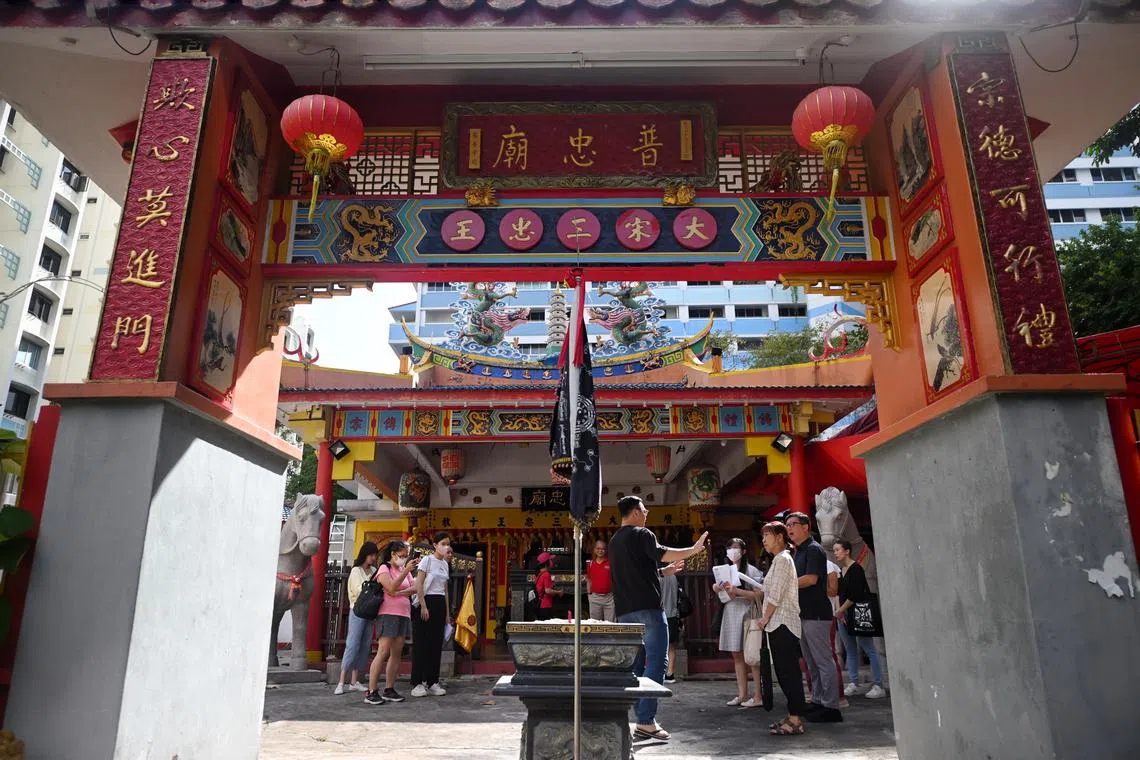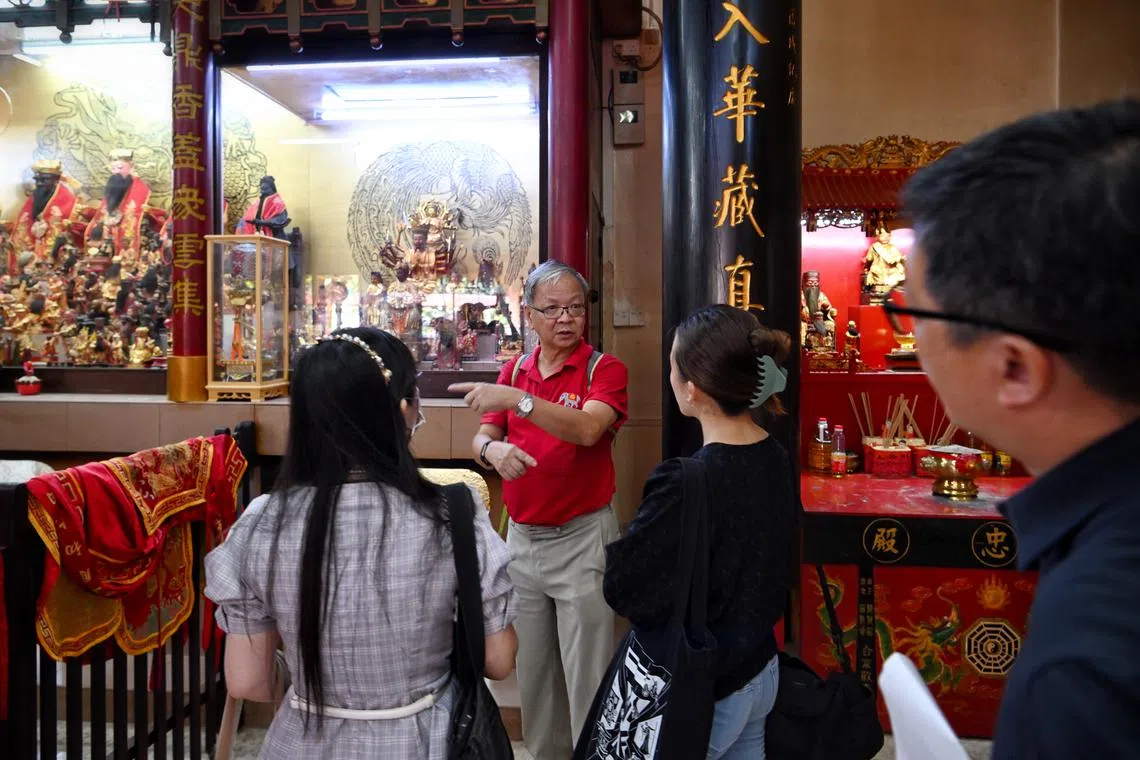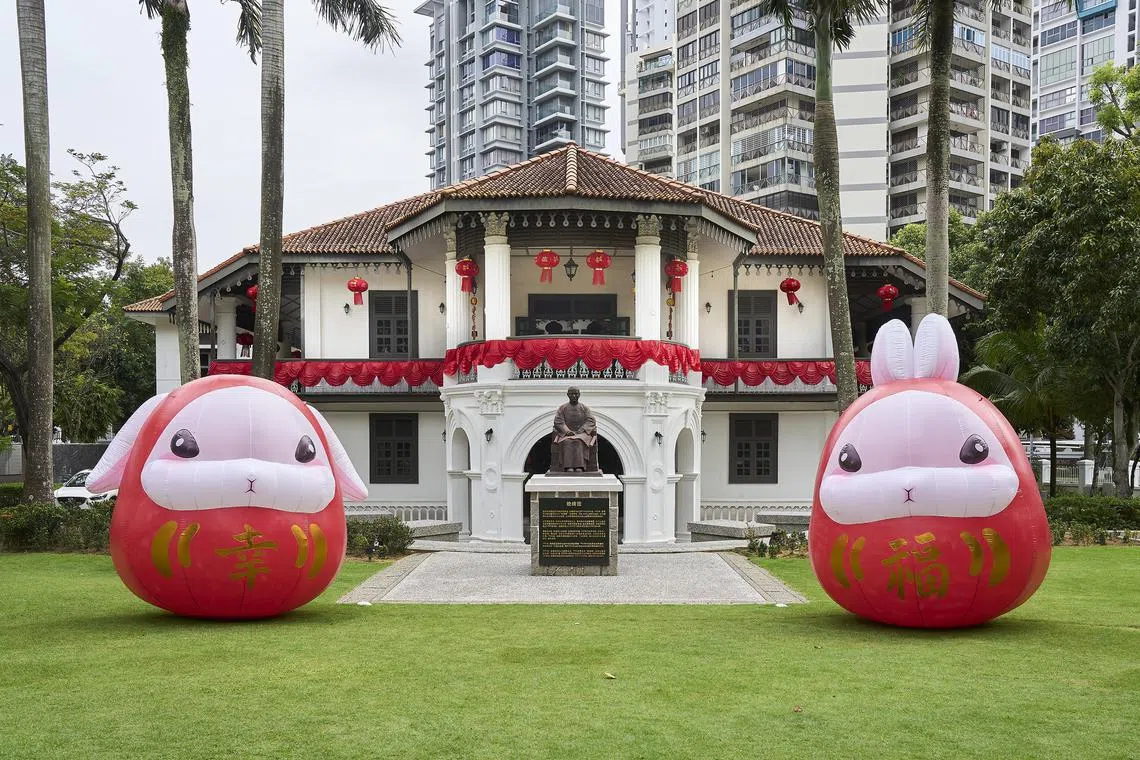Sincerity matters over speed in offering CNY incense, temple tours show
Sign up now: Get ST's newsletters delivered to your inbox

Mr Andy Yeo (centre), general secretary of Poh Chung Tian Chor Sian Tong temple, leading members of the media on a tour on Jan 5.
ST PHOTO: KUA CHEE SIONG
SINGAPORE - At the stroke of midnight on Chinese New Year, ethnic Chinese in places like Singapore, Malaysia and Taiwan rush to be among the first to plant incense offerings at temples, a custom known as tou xiang (or “first joss sticks”).
The belief is that doing so will maximise one’s blessings from the deities – with the person in first place getting a year’s worth of good fortune – but a temple representative said the secret is in one’s sincerity, and not nimbleness.
Mr Andy Yeo, 48, general secretary of Poh Chung Tian Chor Sian Tong at Toa Payoh Lorong 6, told The Straits Times: “Devotees can offer their prayers with a pair of Mandarin oranges any time during the 15 days of the Chinese New Year.
“The fact is, most temple workers would already have been the first to offer incense to the gods before the public.”
Other ways that some temples mark the start of the new year include striking a metal plate and drum 12 times – 13 in a leap year – to usher in good luck for the months ahead.
This and other factoids about how devotees mark Chinese New Year will be shared by temple representatives and volunteer guides at the Touring Temples: Lunar New Year and Temple Traditions tours in the next fortnight, as part of the Sun Yat Sen Nanyang Memorial Hall’s Festival of Spring 2023.
Other rituals being explained include why special deities are venerated in this region, and why various temples here hold major celebrations at different points during the 15-day lunar festival.
How different temples mark the new year is often decided by the dialect group they serve.
Mr Ng Zi Zhang, 42, chairman of the charity and welfare committee with the Toa Payoh Seu Teck Sean Tong, said the temple expects huge crowds during the 14th and 15th day of the festive period when there will be mass prayers, offerings and lion dance.
“We are a Teochew temple and to Teochews, the 15th day or Yuan Xiao Jie is the most important day,” he said. “As a multicultural society, we welcome everyone and have even seen tourists and migrant workers joining us in past years.”
Conversely, many Hokkiens choose to visit temples and make their prayers on the ninth day of the Chinese New Year, which is the birthday of the Jade Emperor – one of the most important Taoist deities.
Temple guide Victor Yue said the tours should appeal to everyone interested in Singapore’s culture and history.
The 70-year-old retired engineer said: ”Temples tell us the history of early immigrants and how the practices evolve as they are influenced by other races and religions. For example, some temples worship Datuk Gong, whom they viewed as a god of the native land.”
Datuk Gong is a Malay figure in a songkok who is similar to the Chinese earth deity Tua Pek Kong, and is worshipped by devotees of different ethnicities here.

Temple guide Victor Yue (in red) said the tours should appeal to everyone interested in Singapore’s culture and history.
ST PHOTO: KUA CHEE SIONG
Mr Alvin Tan, National Heritage Board’s deputy chief executive (policy and community), said the tours provide behind-the-scene peeks into what visitors can expect when they visit temples during the festive period.
“The memorial hall may consider making the temple tours a regular programme for future editions of its Festival of Spring depending on public demand and participants’ feedback,” he added.
Besides the temple tours, the memorial hall is organising other Chinese New Year activities. It also has a lawn installation featuring two rabbits titled “Bunny-ful Blessings”.

The Sun Yat Sen Nanyang Memorial Hall’s lawn installation featuring two rabbits titled “Bunny-ful Blessings”.
PHOTO: SUN YAT SEN NANYANG MEMORIAL HALL
The tours, to be held over the next two weekends, will each cover two of six temples here: Hong San See, Poh Chung Tian Chor Sian Tong, Qi Tian Gong, Sar Kong Mun San Fook Tuck Chee, Thian Hock Keng and Toa Payoh Seu Teck Sean Tong.
They will be conducted in both English and Mandarin from 10am to 12.30pm. Tickets are priced at $20 per participant.


